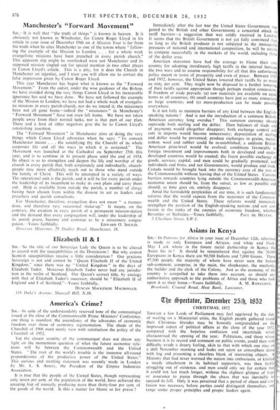America's Crime?
SIR.—In spite of the understandably reserved tone of the communique issued at the close of the Commonwealth Prime Ministers' Conference, one thing is manifest: the ascendancy of the advocates of economic freedom over those of economic regimentation. The shade of the Churchill of 1906 must surely view with satisfaction the policy of the Churchill of 1952.
Yet the closest scrutiny of the communiqué does not throw any light on the momentous question of what the future economic rela- tions will be between the Commonwealth and the United States. "The root of the world's trouble is the immense all-round preponderance of the productive power of the United States." This curious and startling statement was recently' made in London by Mr. L. S. Amery, the President of the Empire Industries Association.
It is true that the people of the United States, though representing only seven per cent. of the population of the world, have achieved the amazing feat of annually producing more than thirty-four per cent. of the goods of the world. Is this a matter for blame or for praise ?
Immediately after the last war the United States Government sug. gested to the British and other Governments a concerted attack on tariff barriers—a suggestion that was coldly received in London. It seems that the British Government is not yet fully convinced that, as long as the British producer is not subjected to the inescapable pressures of national and international competition, he will be unable to compete successfully in the markets of the world, including those of the dollar area.
American statesmen have had the courage to blame their owe country for adopting inordinately high tariffs in the interval between the two wars and to assume responsibility for all that this unfortunate policy meant in terms of prosperity and even of peace. Between 1937, and 1952, however, the United States lowered their tariffs by as much as sixty per cent. They might now be disposed to a further lowering of their tariffs against appropriate though perhaps modest concessions, If freedom of trade prevails: (a) raw materials are available on equal terms to all countries; (b) small countries have just as many consumers as large countries; and (c) mass-production can be made possible everywhere.
Is it not folly to maintain barriers of any kind between the English- speaking nations ? And is not the introduction of a common British- American currency long overdue ? This common currency should supersede both sterling and the dollar. Then balances of trade and of payments would altogether disappear; both exchange control and cuts in imports would become unnecessary; depreciation of sterling and dollar would be prevented; produce exchanges in grains, metals, cotton, wool and rubber could be re-established; a uniform British- American price-level would be evolved; conditions favourable to foreign investment and improvements both in developed and under- developed countries would be created; the freest possible exchange of goods, services, capital, and men could be gradually promoted; and individuals and firms, and not Governments, would produce and trade. Canada would be brought back into the currency area of the rest of the Commonwealth without leaving that of the United States. Customs barriers towards countries lying outside the Commonwealth-American economic union should be, from the outset, as low as possible and should; as time goes on, entirely disappear.
Amid the formidable perplexities of our time, it is such fundamental reforms that the world expects from the statesmen of the Common- wealth and the United States. These reforms would immensely strengthen the position of the English-speaking nations and sow con- fusion in the ranks of the enemies of economic freedom, whether Bevanites or Stalinites.—Yours faithfully, PAUL DE HEVESY. 5 Cheshant Street, S.W.1.


























 Previous page
Previous page